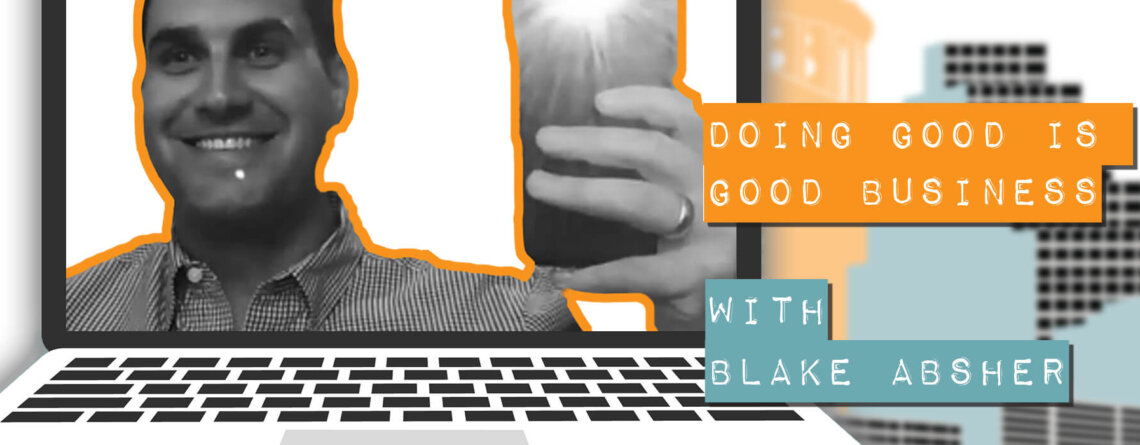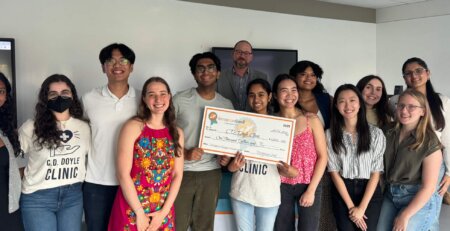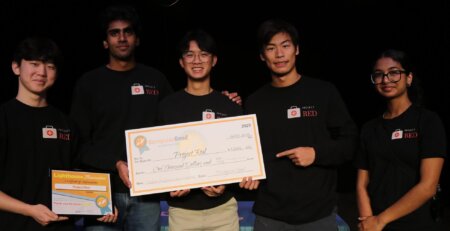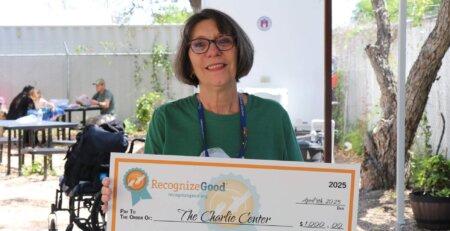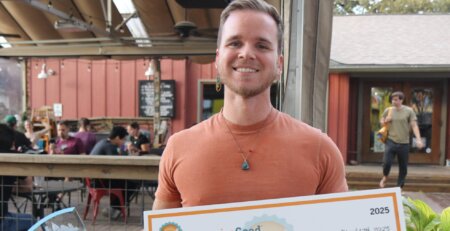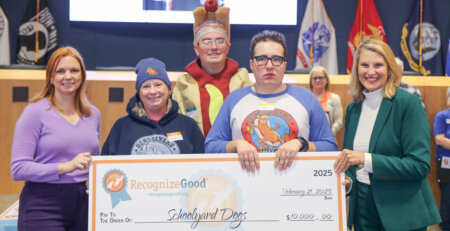Doing Good is Good Business: Blake Absher, Truist
Amit2024-01-22T17:42:24-06:00RecognizeGood took its 2020 Ethics in Business Awards program virtual, and got to interview this year’s award finalists in-depth via Zoom over the month of April. While our video edit requires brevity, hearing from these inspiring ethical business leaders moved us to post the full interview transcription for others to learn from. Relive the entire awards show anytime, or keep reading to learn what ethical business leadership looks like to 2020 honoree Blake Absher of Truist.
RecognizeGood: How have you been doing during quarantine times?
Blake Absher: It’s been stressful, anxious, and demanding – but also so rewarding! We’ve found so much purpose in what we’re doing. It’s been a litany of emotions.
RG: That is great to hear. Like a “you don’t know how good you’ve got it till it’s gone” sort of situation. In your business and your personal life you were investing in something that you may never have needed to access, but now when you need to access it, you’re glad you’ve got it.
BA: Absolutely. Sometimes we don’t have all the answers, and we have to live in the confines of the processes that are set up. Whenever you serve or work with people who are facing extremely challenging circumstances, it’s good just to start with being there and showing empathy. I had a teammate tell me that they’d gotten an honorary PhD in client management.
“WHENEVER YOU SERVE OR WORK WITH PEOPLE WHO ARE FACING EXTREMELY CHALLENGING CIRCUMSTANCES, IT’S GOOD JUST TO START WITH BEING THERE AND SHOWING EMPATHY.”
RG: What’s been the biggest or the toughest adjustment internally with your team in terms of figuring out how to treat people well?
BA: Missing out on the gratification you get from social interactions with your team, with your family, with clients, with community. We’ve had all kinds of conference calls and video conferences, but you miss how fulfilling it is to be around other human beings and the kind of energy and fulfillment it gives you.
It’s been by far the hardest thing of adjusting to working from home – not seeing their smiling faces or being able to just go and stand in their doorway and shoot the breeze or catch up on things. Not being out in the community and not seeing the folks that you serve with, not seeing your teammates or friends and family. I think we’re going above and beyond trying to find ways to still stay connected and see each other, whether it’s virtual “happy hours” or virtual family get-togethers and drive-by birthday parties. But we’re still missing that fulfillment and seeing smiling faces, whether it’s in the office or at a community event or with clients. So I think just not having the same access to that gratitude and fulfillment that comes from doing our work in-person has been the hardest challenge of this.
RG: I know you do a lot out in the community representing BB&T / Truist, and you’re so engaged in the community in a million different ways. How’s that been affected, either representing your business or just personally?
BA: The biggest one is just so many events have either been canceled, rescheduled, or maybe gone to some type of virtual setup, so that that’s probably been the biggest factor. I’m serving on a board and now we’re having virtual board meetings, and some of that is around cash flow management and PPP loans. How are we keeping those teammates safe and out of harm’s way while respecting the shelter in place order? How do they still engage with their constituents and serve a purpose out in the community and making sure that they’re living their mission?
You’re constantly having to revisit and, not reinvent, but find new ways to do these things, whether that’s youth mentoring or health professions that we’re involved with.
What my wife and I have tried to do is to go ahead and accelerate financial obligations that we had with these organizations that we’re involved with during these challenging times. Just knowing that there is a pandemic going on and some of these very important organizations that serve a litany of different purposes and missions out in our community are hurting and you’ve got people in their homes, you have people that are unemployed who are finding themselves furloughed or having their hours reduced and so we just took it upon ourselves to ask how we can continue to support these organizations through our personal advocacy – as well as looking at ways where our organization Truist is involved.
Truist announced a $25 million foundation, called Truist Cares. We’ve been supporting different organizations during this pandemic and we’re getting ready to replenish that Truist Cares fund to further support the country and those who are being affected. It’s multifaceted – going back to youth mentoring, now you’re not able to have meetings the same way, not being able to pick up a child you’re mentoring or supporting. We’ve been finding different ways through digital channels and touchpoints and sending notes and little reminders and trying to really be creative to make sure that they’re still top of mind.
RG: I know the that that the sign on the building has changed recently, but your people are still your people regardless of the name that’s on the business cards. You’ve had help, I’m sure, but you’ve primarily built a good culture within BB&T for years, and now Truist. What did you notice once work changed for everybody? What were you thankful that you kind of already put into place? Was there something that you’ve been doing along the way that you were especially thankful for once everything changed on us?
BA: The relationship building I think is key, you know, having really genuine, sincere relationships with your teammates. The thing that I’ve probably learned the most about is the risk of sharing [COVID-related] things in real time because everything changes so quickly. Making sure that we’re communicating things as accurately as humanly possible in real time, but with the catch that everything is subject to change. I may be calling you back within the hour, and we may be pivoting.
Trying to communicate things as quickly as possible so that our teammates feel like they know why decisions are being made has been a challenge, but I think having those one-on-one authentic relationships will get through us this. Brighter days are ahead. While that may not happen as quickly as any of us would like, we will weather it together. That’s just the resilience of our country. We’ll get through this, but it’s just not happening at nearly the speed that I think any of us would want.
We talk a lot in our team about having fierce conversations, and that word “fierce” I think so often gets a negative connotation, but fierce can be about having conversations with passion and integrity and authenticity and collaboration. So we’re just trying to have really fierce and honest conversations – not sugarcoating things, knowing that there is a ton of uncertainty, and that we’ve had to pivot. We’ve had to make decisions and take risks in those decisions, and we’re going to make mistakes, but we’re not going to dwell on them. If we did things with the absolute best intentions and we didn’t lie, we didn’t cheat, then at the end of the day, we know that that we’re trying to do things to the best of our abilities. So that’s been the biggest thing – being able to look folks in the eyes, even if it’s on a video conference, and share why we’re doing things.
“WE’RE JUST TRYING TO HAVE REALLY FIERCE AND HONEST CONVERSATIONS – NOT SUGARCOATING THINGS, KNOWING THAT THERE IS A TON OF UNCERTAINTY, AND THAT WE’VE HAD TO PIVOT. WE’VE HAD TO MAKE DECISIONS AND TAKE RISKS IN THOSE DECISIONS, AND WE’RE GOING TO MAKE MISTAKES, BUT WE’RE NOT GOING TO DWELL ON THEM. IF WE DID THINGS WITH THE ABSOLUTE BEST INTENTIONS AND WE DIDN’T LIE, WE DIDN’T CHEAT, THEN AT THE END OF THE DAY, WE KNOW THAT THAT WE’RE TRYING TO DO THINGS TO THE BEST OF OUR ABILITIES.”
RG: I believe that there’s a difference between optimism and positivity – positivity can simply mean ignoring negative realities, but optimism can mean being truly hopeful and believing that things are going to be okay.
BA: And I agree. I think I’m an optimist. I think it’ll be okay. And again, we’re résumé-building these days. We’re learning how to do all kinds of stuff. It’s been so remarkable not just for Truist, but to see how many companies are really rising to the occasion and putting their teammates and their clients at the forefront of all decisions. Whether it’s by providing additional childcare benefits, or increasing compensation for those essential employees who have to be in our branches to serve our small business clients. For me, seeing how swiftly companies have rallied to support their teammates, even taking risk to do so, has been truly inspiring – seeing our company do some unique things that I’ve never seen in my career, and trying to thank those employees for what they’re doing.
RG: Blending business with community and having a heartfelt mission to serve in both has been something you’ve done really well for a long time – where does that come from?
BA: Just from growing up in church, my parents gave me good role models. The two are so intertwined – what you do in your home life, what you do at work, how you live your life. I’ve heard people say, “Well, if your personal life is a 2 try to make your career a 10,” and just from my experiences you’re much better off trying to really dovetail them all and intertwine them all into one.
RG: Lots of times that happens whether you want it to or not.
BA: Exactly, you might as well lean into it. That’s exactly right.
RG: Being in banking and specifically leading a bank system of your size – is there anything about the exact kind of space you’re in that has made anything unique that other banks or other businesses wouldn’t have to be dealing with right now?
BA: We’re probably in a very unique situation – we’re right in the midst of a merger, actually the largest banking merger that’s happened since the Great Recession. To be in the midst of blending two companies, two cultures, and then have this very unfortunate set of circumstances with a health crisis that is impacting so many facets of our daily life – that would have to be considered a unique position.
I think maybe there was some skepticism, but I think we’ll all realize over time that we truly are better as one. I think the impetus of this merger was that we really would be better together. And not just from a financial metric, but just what we can be capable of and how that can then impact our communities and be better for our clients. For instance, we’ve never had an online lending portal. And this PPP work has caused us to swiftly act and do things that maybe had been on the shelf or that maybe we hadn’t yet committed resources into – all of a sudden we’re standing some of these things up in a matter of days, if not hours.
I heard a story recently. This boy was on the shore and an older gentleman was up on the banks watching him throw starfish back in the ocean. The older gentleman came up said, son why are you doing that? And the boy said, I’m trying to save the starfish and get them back into the ocean. And the old man said, you know you can’t save them all. And the boy said, but I’m gonna save this one. That’s really resonated with me – being in the moment, trying to do the very best at what’s in front of us. But at the same time, I think it keeps us up at night if we weren’t able to save one or help that client. It’s that never-ending, continuous improvement of wanting to be able to help everybody you possibly can.
One of the really cool things at our new [blended] company is one of our values – “when our clients win, we all win.” So we try to have that mentality of supporting our clients and if we’re doing the right things, then ultimately as a company, we’re winning. It’s stuck with me – not only trying to save those starfish, but also just asking why weren’t we able to help somebody? How can we learn from it and be better at the next opportunity we’re given with them?
BLAKE ABSHER: “NO ONE CAN DO EVERYTHING, BUT EVERYONE CAN DO SOMETHING. IT’S KIND OF THE SAME STORY AS BEFORE. ACT SWIFTLY. DON’T SIT ON YOUR HANDS AND GO OUT THERE AND MAKE A DIFFERENCE. JUMP HEADFIRST OFF THE DIVING BOARD. THAT’S WHAT WE’VE BEEN TRYING TO DO WITH OUR CLIENTS. THERE’LL BE PROCESSES THAT AREN’T PERFECT, BUT WE JUST ASK FOR THEIR PATIENCE, WE CONTINUE BEING RESILIENT, AND HOPEFULLY PROVIDE A GOOD OUTCOME FOR THEM THROUGH THIS.”
RG: This idea of doing well by doing good in our businesses, what does it mean to you?
BA: I’ve just feel blessed that the small army of folks who have lifted me up allow me to do what I do and go out and be in the community. My wife, my family, all my teammates, I’m very humbled by it. There truly are a lot of people that are pushing behind the scenes who might not get their name in the headlights. I’m just so grateful and humbled.
I think it goes back to what you said RecognizeGood is all about. It’s all about caring. Everyone, in every moment, matters. I’m grateful, but with that being said, there’s just so many folks who lifted me up and encouraged me to go out and do more, to take more risks, to serve selflessly. It’s also so much fun whenever you get to see a client in a different capacity when you are serving on a nonprofit committee or a board with them in fundraising. Yes, there’s a business aspect and you have to put that that hat on and have business conversations, but when it can be a holistic and synergistic relationship with friends and clients – that’s what this is about.
